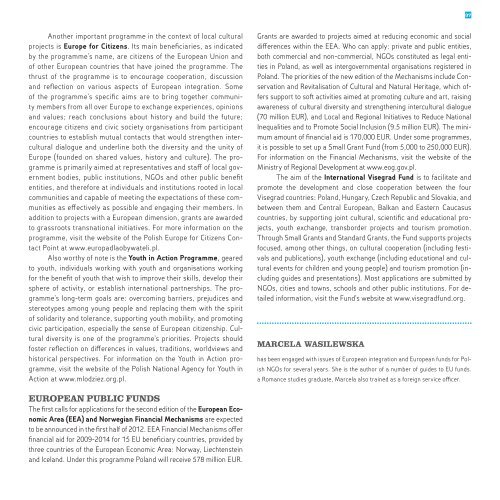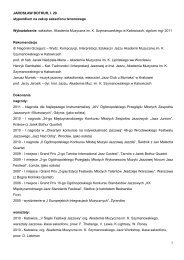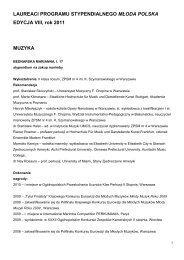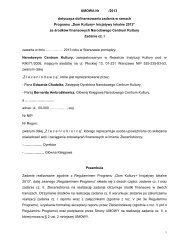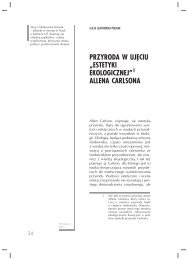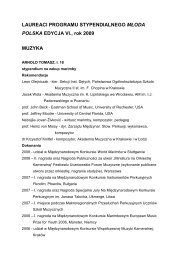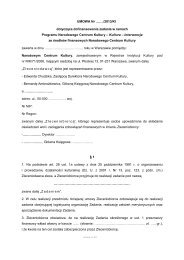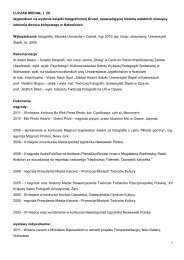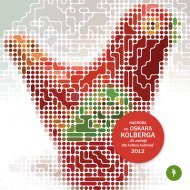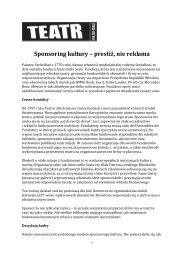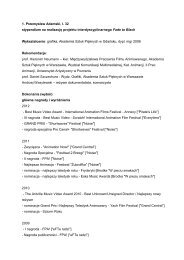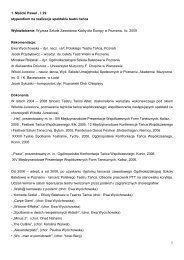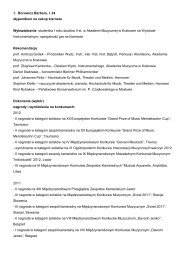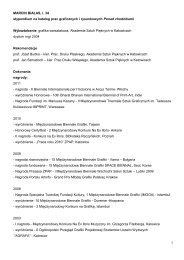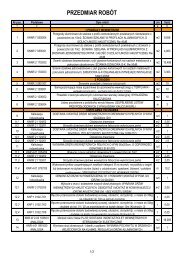Untitled - Narodowe Centrum Kultury
Untitled - Narodowe Centrum Kultury
Untitled - Narodowe Centrum Kultury
You also want an ePaper? Increase the reach of your titles
YUMPU automatically turns print PDFs into web optimized ePapers that Google loves.
tytuł artykułu 37<br />
Another important programme in the context of local cultural<br />
projects is Europe for Citizens. Its main beneficiaries, as indicated<br />
by the programme’s name, are citizens of the European Union and<br />
of other European countries that have joined the programme. The<br />
thrust of the programme is to encourage cooperation, discussion<br />
and reflection on various aspects of European integration. Some<br />
of the programme’s specific aims are to bring together community<br />
members from all over Europe to exchange experiences, opinions<br />
and values; reach conclusions about history and build the future;<br />
encourage citizens and civic society organisations from participant<br />
countries to establish mutual contacts that would strengthen intercultural<br />
dialogue and underline both the diversity and the unity of<br />
Europe (founded on shared values, history and culture). The programme<br />
is primarily aimed at representatives and staff of local government<br />
bodies, public institutions, NGOs and other public benefit<br />
entities, and therefore at individuals and institutions rooted in local<br />
communities and capable of meeting the expectations of these communities<br />
as effectively as possible and engaging their members. In<br />
addition to projects with a European dimension, grants are awarded<br />
to grassroots transnational initiatives. For more information on the<br />
programme, visit the website of the Polish Europe for Citizens Contact<br />
Point at www.europadlaobywateli.pl.<br />
Also worthy of note is the Youth in Action Programme, geared<br />
to youth, individuals working with youth and organisations working<br />
for the benefit of youth that wish to improve their skills, develop their<br />
sphere of activity, or establish international partnerships. The programme’s<br />
long-term goals are: overcoming barriers, prejudices and<br />
stereotypes among young people and replacing them with the spirit<br />
of solidarity and tolerance, supporting youth mobility, and promoting<br />
civic participation, especially the sense of European citizenship. Cultural<br />
diversity is one of the programme’s priorities. Projects should<br />
foster reflection on differences in values, traditions, worldviews and<br />
historical perspectives. For information on the Youth in Action programme,<br />
visit the website of the Polish National Agency for Youth in<br />
Action at www.mlodziez.org.pl.<br />
Grants are awarded to projects aimed at reducing economic and social<br />
differences within the EEA. Who can apply: private and public entities,<br />
both commercial and non-commercial, NGOs constituted as legal entities<br />
in Poland, as well as intergovernmental organisations registered in<br />
Poland. The priorities of the new edition of the Mechanisms include Conservation<br />
and Revitalisation of Cultural and Natural Heritage, which offers<br />
support to soft activities aimed at promoting culture and art, raising<br />
awareness of cultural diversity and strengthening intercultural dialogue<br />
(70 million EUR), and Local and Regional Initiatives to Reduce National<br />
Inequalities and to Promote Social Inclusion (9.5 million EUR). The minimum<br />
amount of financial aid is 170,000 EUR. Under some programmes,<br />
it is possible to set up a Small Grant Fund (from 5,000 to 250,000 EUR).<br />
For information on the Financial Mechanisms, visit the website of the<br />
Ministry of Regional Development at www.eog.gov.pl.<br />
The aim of the International Visegrad Fund is to facilitate and<br />
promote the development and close cooperation between the four<br />
Visegrad countries: Poland, Hungary, Czech Republic and Slovakia, and<br />
between them and Central European, Balkan and Eastern Caucasus<br />
countries, by supporting joint cultural, scientific and educational projects,<br />
youth exchange, transborder projects and tourism promotion.<br />
Through Small Grants and Standard Grants, the Fund supports projects<br />
focused, among other things, on cultural cooperation (including festivals<br />
and publications), youth exchange (including educational and cultural<br />
events for children and young people) and tourism promotion (including<br />
guides and presentations). Most applications are submitted by<br />
NGOs, cities and towns, schools and other public institutions. For detailed<br />
information, visit the Fund’s website at www.visegradfund.org.<br />
marcela wasilewska<br />
has been engaged with issues of European integration and European funds for Polish<br />
NGOs for several years. She is the author of a number of guides to EU funds.<br />
a Romance studies graduate, Marcela also trained as a foreign service officer.<br />
European public funds<br />
The first calls for applications for the second edition of the European Economic<br />
Area (EEA) and Norwegian Financial Mechanisms are expected<br />
to be announced in the first half of 2012. EEA Financial Mechanisms offer<br />
financial aid for 2009-2014 for 15 EU beneficiary countries, provided by<br />
three countries of the European Economic Area: Norway, Liechtenstein<br />
and Iceland. Under this programme Poland will receive 578 million EUR.


